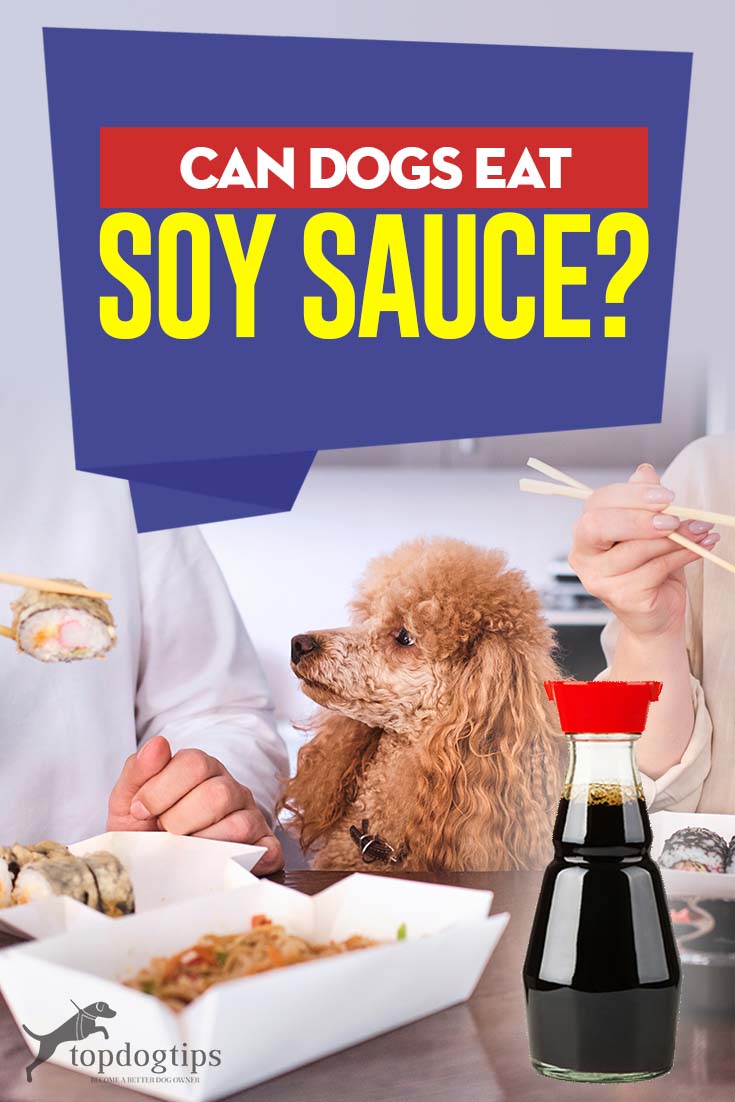Many of us dog owners love to give dogs treats throughout the day for training, good behavior, or to express the love, but many foods that people eat are unsafe for dogs to eat. Soy sauce is just one of many foods that people can enjoy, but one that should NOT be given to dogs.
Dogs cannot eat soy sauce because it is extremely high in sodium. In fact, there are 1,000 milligrams of sodium in only one tablespoon of soy sauce. Unlike humans, dogs are sensitive to sodium so their sodium intake should be restricted as much as possible. Too much sodium can be toxic to dogs, but even if a dog does not ingest a toxic amount of sodium they may suffer adverse side effects.
There are several side effects to giving your dog soy sauce, but four major ones range from salt poisoning, to kidney failure, to toxicity, to death. Each of these side effects comes with a variety of symptoms as well as treatments.
Kidney Failure and Salt Poisoning
Dogs can experience kidney failure or salt poisoning due to the ingestion of high amounts of sodium (such as from consuming soy sauce). The exact amount of sodium that is harmful to a dog depends on several factors, including: the dog’s age, the dog’s weight, the dog’s breed, and the dog’s overall health.
Most veterinarians agree that it could take just a teaspoon of soy sauce to cause your dog problems. If your dog ingests a high amount of soy sauce, or other source of sodium, you should first make sure that they have access to water and watch them closely for other symptoms of kidney failure or salt poisoning as you contact your veterinarian or pet poison hotline.
Salt poisoning in dogs may cause a number of neurological problems and could also cause death when consumed in large amount by the animal.
Some of the symptoms of salt poisoning in dogs include: excessive thirst, increased urination, diarrhea, vomiting, tremors, or even seizures. Salt poisoning can cause your dog to go into kidney failure, too.
Kidney failure has all of the symptoms of salt poisoning, but also includes: urine with blood in it, ulcers in the mouth, decreased appetite, stumbling, or listlessness. If left untreated, kidney failure can be fatal to dogs.
If you suspect that your dog has kidney failure or sodium poisoning, then you should bring them to the veterinarian as soon as possible. Your veterinarian will be able to properly diagnose your dog and get them the prompt medical treatment that they need.
Treatments for kidney failure vary based on the severity and diagnosis, but may include: medication, intravenous fluids, dialysis, a change in food or diet, and monitoring.
Toxicity and Death
In addition to causing salt poisoning or kidney failure, your dog eating soy sauce may also cause them to suffer from toxicity which may lead to eventual death. This is because some types of soy sauce might contain garlic or onions, for example. Both garlic and onions are toxic to dogs in large amounts. These vegetables can cause your pup to start vomiting, have diarrhea, weakness, abdominal pain, intolerance to exercise, and excessive drooling. The same is true for the ingestion of onions.
Symptoms from garlic or onion poisoning may take hours or even days to show up. Your dog may be more or less sensitive to the effects of garlic or onion based on their breed. Some breeds, like Japanese dog breeds, are more sensitive to garlic or onion ingestion.
The toxicity from garlic and onions can lead to severe complications and health issues. Organ failure, anemia, heart damage, and even death can occur if your dog ingests garlic. Remember that what may seem like a small amount of garlic or onion for you to eat could be fatal to your dog. It is best to keep garlic and onions away from your dog as well as other foods that may contain garlic or onions, such as soy sauce.
Once properly diagnosed by a veterinarian, treatment for toxicity may include monitoring, medication, intravenous fluids, oxygen therapy, or even a blood transfusion.
In Summary
Soy sauce should NOT be made part of your dog’s regular diet because it contains such a large amount of sodium that can be harmful to your dog. In fact, dogs do not need additional seasonings on their food at all, so there's never any reason to give soy sauce to your pet. Many other seasonings can cause your dog to have any number of problems, including the ones listed above.
If your dog ingests a small amount of soy sauce or you have given your dog food that has contained soy sauce in the past, be sure to monitor them for any possible side effects and try to avoid feeding them foods that contain soy sauce in the future. If you must give your dog food from the table or the refrigerator, you should check with your veterinarian to ensure that the food is safe for your dog.
There are many human foods that are safe for dogs. If you are unsure if a particular type of food is safe for your dog to eat, ensure that you do a little research prior to feeding them. It is easier to not give your dog that seemingly healthy treat rather than have them suffer side effects from unknowingly, but potentially toxic food.
READ NEXT: 7 Hidden Toxins in Your House That’re Poisonous or Cancerous to Dogs















